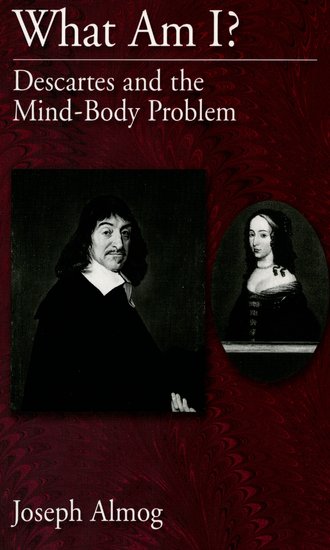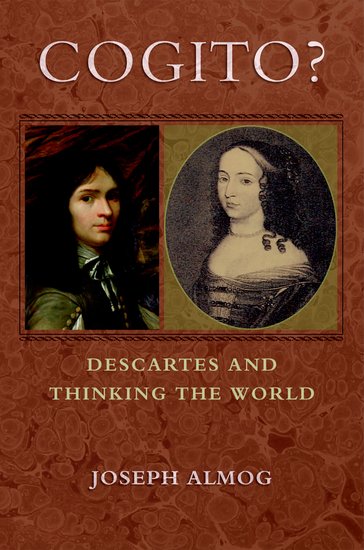Joseph Almog komt met een boek over Spinoza
 Joseph Almog is al meer dan een kwart eeuw bezig met - ruw en globaal aangeduid - de relatie tussen logica en de reële wereld. Of met, zoals het op z'n weinig informatieve pagina bij UCLA staat, waar hij vanaf 1992 filosofieprofessor is in: Metaphysics, Philosophy-of-Language-and-Logic. (Zie hier zijn publicatielijst). Van hem verschenen o.a.:
Joseph Almog is al meer dan een kwart eeuw bezig met - ruw en globaal aangeduid - de relatie tussen logica en de reële wereld. Of met, zoals het op z'n weinig informatieve pagina bij UCLA staat, waar hij vanaf 1992 filosofieprofessor is in: Metaphysics, Philosophy-of-Language-and-Logic. (Zie hier zijn publicatielijst). Van hem verschenen o.a.:

 Joseph Almog, What Am I? Descartes and the Mind-Body Problem [OUP, 2005]
Joseph Almog, What Am I? Descartes and the Mind-Body Problem [OUP, 2005]
Joseph Almog, Cogito? Descartes and Thinking the World. [OUP, 2008]
Naar ik begrepen heb (uit het artikel dat ik hierna noem) was hij aanvankelijk en vele jaren een 'moderne essentialist', iemand die sterk vanuit definities/essenties en - in Aristotelische termen geformuleerd - 'formal causation' redeneerde. Maar een paar jaar geleden ging hij óm en had in de gaten gekregen dat in de natuur, in de kosmische processen, alleen 'efficient causation' aan de orde is. En dat "[o]ur understanding Nature is nothing but Nature taking its course."
Dit is de fraaie laatste zin van een intrigerend artikel (waarvan het lezen mij niet makkelijk afgaat, want zoveel weet ik niet van de geschiedenis van de wiskunde en de logica en van het denken en spreken over de ideeëngeschiedenis ervan, maar waarvan ik de hoofdlijn van het betoog toch redelijk kon volgen). Dat artikel heeft de titel "Nature without essence", verscheen in de Journal of Philosophy [107 [2010] (7):360-383] en is als officieel gratis PDF bij dat tijdschrift te downloaden. Joseph Almog heeft een soms persoonlijke en steeds heldere, uitleggende schrijfstijl.
Intrigerend is de eindnoot bij die geciteerde laatste zin, waarin hij een korte geschiedenis geeft van hoe hij bezig was met het onderwerp van dat artikel en van zijn ommekeer. Ik citeer uit die lange eindnoot de volgende passage:
"It was work in the last decade on two different topics that led to the turnabout. One tributary was a series of classes I taught (some with Tony Martin) on the turn-of-thecentury mathematical axiomatic thinkers: one was dedicated to Gödel, one to Hilbert’s motif “we must know, we will know,” and, most critically, one focused on Dedekind and Skolem. In the last, I read off the rationalist man’s dilemma vis-à-vis the limits of axiomatic set-theoretic foundations for arithmetic from Skolem (see the last few pages of the present paper). The other tributary was continued work on Descartes’ concept of Nature (and “true and immutable natures”) in a monograph called Cogito? (New York: Oxford, 2008). This drove me to wonder about a theme spanning the seventeenth and eighteenth centuries making Nature-as-a-whole into the prime object of both scientific and metaphysical investigation. Goaded by teaching Nature-theorists like Spinoza with John Carriero, I came to revisit my own “modern” work on essentialism and natures. This led to the present work."
Door Spinoza werd hij dus a.h.w. bekeerd...
In dat artikel verder niets over Spinoza, maar ik had soms wel het gevoel dat m.n. Spinoza's door-en-door nominalisme en zijn wijzen op het risico abstracte algemene noties als reële dingen aan te nemen i.p.v. als denkdingen, en vooral de enige door hem erkende oorzaak (de efficiënte) op de achtergrond meespeelde. Laat nu van deze Joseph Almog een boek over Spinoza worden aangekondigd door de Oxford University Press (ik meldde het al in een vorig blog):
Joseph Almog, Everything in Its Right Place. Spinoza and Life by the Light of Nature. OUP, February 2014 (estimated; volgens Amazon verschijnt het 9 januari 2014)
In Everything in Its Right Place, Joseph Almog develops the unitarian and universalist metaphysics of Spinoza. Spinoza's ground zero thesis is that <"Nature is one and all.>" Everything (including God, mathematics, morals, our own thoughts) finds its place within Spinoza's (capital N) Nature. It is the place that each thing occupies within the grid of Nature-from God on down the cosmic tree of being-that determines its fundamental (lowercase n) nature. For Spinoza, one's nature is determined by one's place in Nature or, in terms of the fundamental axiom of the book-the Nature-unfolding axiom: the nature of x=Nature at x.
Almog's reading of Spinoza is distinct in its understanding of the deductive abstractions of part I-II of the Ethics by means of the concrete illustrations of Spinoza's intended subject matter in his political writings, where he tells us directly (i) what Nature is and (ii) how man's nature is not a separate kingdom from the Nature-kingdom but merely an unfolding of it. This leads, as in the Ethics, to a final chapter on what it meant to Spinoza to live in symbiosis with Nature and, therefore, to be one with it-and with God.
Ik denk wel dat ik t.z.t. nieuwsgierig ben naar dat boek.

